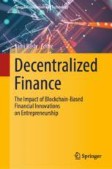Search
Search Results
-
Vanguard of Internet Finance: Third-Party Payment
Third-party payment is credited as the “vanguard” of Internet finance. Though third-party payment is not invented specifically for Internet finance,...
-
The Impact of Third-Party Financial Products on the Consumer Loan Services Market in the Banking Sector: An Analysis of Sales Progress and Consumer Behavior
Certain predominant Banks astride across India stayed esoterically stable while graphing nascent opportunities in retail banking sectors to intensify...
-
An integrated framework for understanding information disclosure behaviour in mobile payment services
Privacy concerns persist when consumers disclose information, impacting mobile payment services diffusion. However, information disclosure is...

-
Management of ICT Third Party Risk Under the Digital Operational Resilience Act
Almost a decade ago, the Great Recession revealed that financial institutions behaved in matters that the public authorities were not able to...
-
The impact of personality traits, barriers and gamification on Gen X continuance intention for mobile credit bill payment apps.
Gen X customers find it difficult to adjust to the changing technology trends and hence face issues while using mobile credit bill payment apps....

-
Continuance intention to use smartphone-based payment services: the role of pre-adoption expectancies, usage experience, and conventional inhibitions
The availability of innovative payment services and the growing popularity of smartphone-based payment services (SBPS), particularly among youth,...

-
Do users' pro-environmental personal norms hold significance in electronic payment adoption context?
The adoption of “Electronic Payment Systems (EPS)” presents an effective alternative for mitigating natural ecosystem degradation and serves as a...

-
Currency and Payment Tech: Cryptocurrencies Transforming the Face of Finance
Tax-free and high-speed transactions and anonymity in cryptocurrency ownership spur investors’ interest in these forms of digital assets and currency...
-
A Systemic Review of Payment Technologies with a Special Focus on Digital Wallets
This chapter covers the digital payments’ ins and outs, emphasizing digital wallets. Digital wallets are a relatively new phenomenon that has been...
-
FinTech and Digital Payment Systems Valuation
Financial technology (FinTech) is an industry composed of diversified companies that use technology to make financial services more efficient....
-
Open Banking, Access to Account Rule and (Free) Marketability of Banking Data
The paper is aimed at scrutinizing the fundamental rules applicable to the open banking ecosystem and the provisions on innovative payment services...
-
Payment Systems in Digital Economy
Digital technologies are changing business models and business process management systems in banks. The fintech phenomenon—a combination of...
-
Blockchain-Based New Payment Systems: Digital Currencies
Looking back at history, technological changes have transformed the form of money from commodities, metals and paper to electronic forms. The...
-
salam
salam is an agreement to buy a certain type of commodity at a predetermined price, to be delivered in a certain quantity and quality that will not be...
-
Opportunities, Risks, and Challenges Due to New Framework Conditions
Open banking is undoubtedly bringing momentum to the discussion about what the financial services provider of tomorrow could look like. On January...
-
Digital Currencies and Payment Systems: Chinese Way into Internationalisation of the Renminbi
Banking industry with its traditional payment technology based on a centralised clearing institutions started to face a huge and unequal competition....
-
DeFi Cybersecurity Technical and Nontechnical Risks
Decentralized finance (DeFi) is a financial application built on the public ledger of blockchain technology. This technology allows users to access...
-
Hamish al-Jiddiyya
In Islamic finance, the security deposit is a financial practice that reflects the seriousness and commitment of contracts. The transaction, known as...
-
Bay’ al-Inah
This entry focuses on the contentious bay’ al-inah contract, a two-party sale and buyback structure that generates cash flows that resemble a loan...
-
A Deep Dive into Payments
This chapter explores the various aspects of payments, categorizing them into retail, wholesale, and cross-border types. It discusses the evolution...
